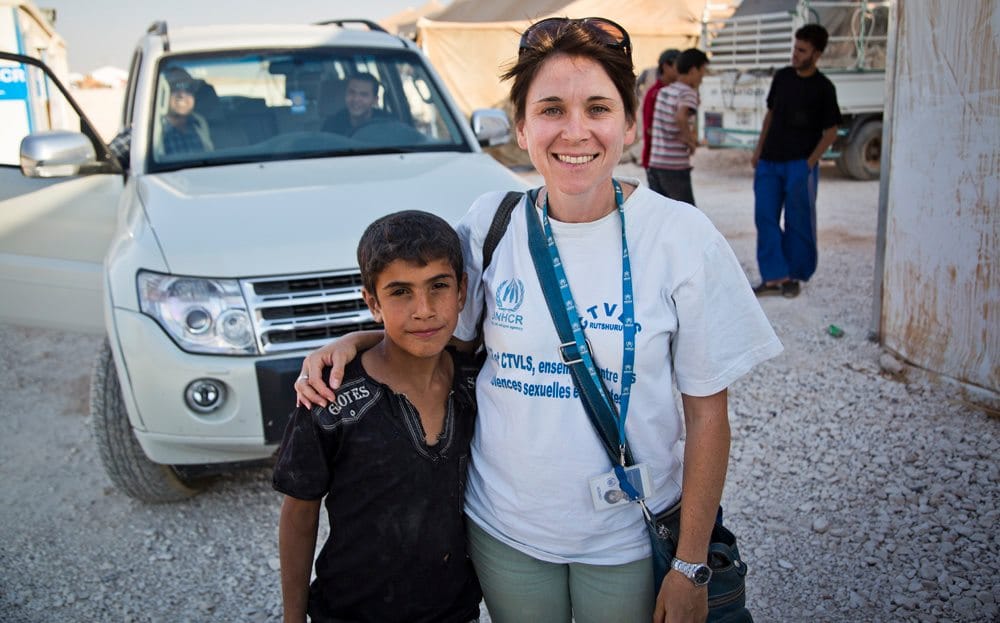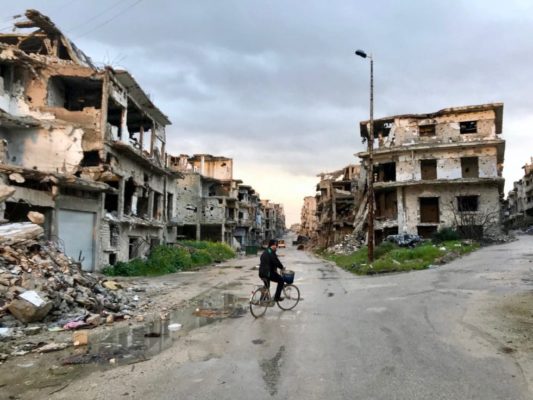
Karen Whiting, Assistant Representative for Protection, is seen with a Syrian refugee boy in Baghad, Iraq. ©UNHCR/Abed Arslan
“Every refugee story strikes me on a personal level”
By Karen Whiting, as told to Hannah Scott
Originally from Ottawa, Karen Whiting is an Assistant Representative for Protection based in Baghdad, Iraq. She is responsible for establishing UNHCR’s protection priorities for operations in Iraq and working to protect Syrian refugees.
What would you like Canadians to know about the ongoing crisis in Syria?
The Government of the Kurdistan Region of Iraq has been very generous in including Syrian refugees in government services and systems that is a model for many governments globally. UNHCR is also working with the central government in Baghdad to register all Syrian refugees countrywide to ensure all Syrians are provided with safety and security through registration and documentation, followed by access to services.
Despite the challenges that Iraq faces, there are success stories that we hope to build upon in 2020, working towards ensuring that Syrian refugees have a broad range of solutions open to them.
You are in the distinctive position of being on the ground to support refugees. What has this experience been like for you?
Every individual refugee story strikes me on a personal level. Every day that I work for UNHCR, I am struck by the fact that as a Canadian, I have been incredibly lucky to benefit from a stable and secure situation growing up and for me and my family to be able to thrive. This should be the right of everyone, everywhere.
We need to do more, as Canada and the international community, to ensure that no one is left behind.
“Children and youth are our future and we should invest in their development and growth.”
What is one thing you would like readers to know about what refugees experience and what their lives are like in camps?
Children and youth are our future and we should invest in their development and growth. No child or young person should spend their key development years in a refugee camp, where there are limited opportunities for development of their capacities, knowledge, skills and resilience. No matter how much we invest in camps, these are not the ideal contexts to develop productive and resilient members of vibrant communities.
While there have been important efforts by UNHCR and partners to support children and youth in camps, we need increased focus on out-of-camp solutions so that refugee children and youth are increasingly integrated in the communities that host them. While formal education is a key area for investment, refugee children and youth need to know that there are opportunities available to them after they complete their formal education.
What does it mean to you to be from Canada, a country that has accepted thousands of Syrian refugees?
I am proud to be a Canadian working for UNHCR. Canada’s generosity and global leadership on refugee issues is one of the reasons why I originally developed an interest in working for UNHCR. I was incredibly proud to be a part of UNHCR’s efforts to resettle 25,000 Syrian refugees in 2015 when I was in the UNHCR Jordan operation, working weekends and holidays to support the Canadian government to meet its commitment. Canada’s leadership in this regard assists me in my advocacy with host governments where I have been posted, and helps me to explain to governments and host communities how refugees can not only contribute to the communities where they are hosted, but also to their economies.
What are the most effective ways that Canadians can support Syrian refugees?
Canadians have been incredibly generous in providing support to Syrian refugees in the Middle East, and Iraq more particularly. UNHCR is grateful for this ongoing support that enables us to provide key, life-saving assistance. Despite this generosity, the needs continue, and we call upon Canadians to continue to support UNHCR’s humanitarian programs globally and the Canadian government’s resettlement efforts.



